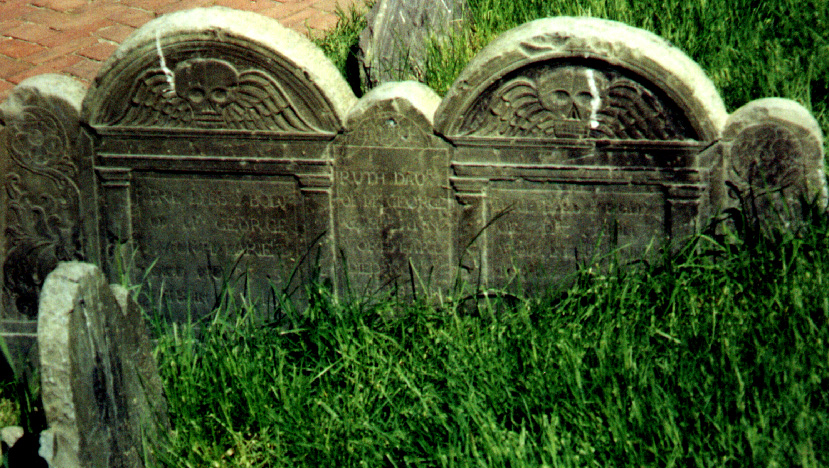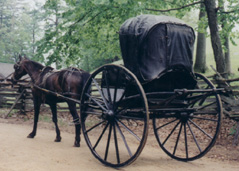 Chronological thinking relates to how we imagine that we all are products of the past.
Chronological thinking relates to how we imagine that we all are products of the past.  Chronological thinking relates to how we imagine that we all are products of the past.
Chronological thinking relates to how we imagine that we all are products of the past.
Three graves on Cop's Hill Boston, one of the nation's oldest burial places for the dead.
Chronological thinking is one of the lessons of history not because of the importance
of time, but because such thought reveals that people were very different from
us, since in the pastthe relation among things  was
different from now. For example 1000 years ago the situation was different from
today because the tools people used required them to behave differently from
us and encouraged people to think differently from the way we depict the world
and our surroundings. In that Medieval period, people in Europe, Asia and Africa
used forests for sources of fuel, food, building, furnishings and implements.
These people had their bodies and the recurrent patterns of the seasons to tell
what time it was of the day or year. They had –if they were fortunate—horse
to ride and to do the labor of plowing fields or moving food and fuel to markets.
was
different from now. For example 1000 years ago the situation was different from
today because the tools people used required them to behave differently from
us and encouraged people to think differently from the way we depict the world
and our surroundings. In that Medieval period, people in Europe, Asia and Africa
used forests for sources of fuel, food, building, furnishings and implements.
These people had their bodies and the recurrent patterns of the seasons to tell
what time it was of the day or year. They had –if they were fortunate—horse
to ride and to do the labor of plowing fields or moving food and fuel to markets.
 Today
that is different, because of changes in technical capabilities, we know the
time by either a digital or analog device we call a clock, the only horse we
have are the 100s of horsepower –as a measure of engine capacity-- available
to fortunate folks who drive automobiles. Forests are distant places that we
may see pictures of or visit on occasion for recreational delight, not for work.
Using chronological thinking, I may comprehend when things changed and how these
combined alterations affect my life.
Today
that is different, because of changes in technical capabilities, we know the
time by either a digital or analog device we call a clock, the only horse we
have are the 100s of horsepower –as a measure of engine capacity-- available
to fortunate folks who drive automobiles. Forests are distant places that we
may see pictures of or visit on occasion for recreational delight, not for work.
Using chronological thinking, I may comprehend when things changed and how these
combined alterations affect my life.
This very day, when I got into my car to come to work from my home that is three
miles from here – I actually entered a time machine. The journey of 90
minutes on foot took less than a quarter of an hour. But in addition to the
digital clock in the car that reveals to me the time of day, a “timing”
belt was enlisted to control the destructive explosions in the vehicles engines
propelling the drive shaft and flywheel that moves the wheels and differential
gear that allowed me to turn in getting swiftly down the streets and around
tight corners.
I call my car a time machine because without the mechanical device to “beat
out the rhythm” to synchronize over 10,000 moving parts, I could not have
shrunk the distance I travel to and from work. Chronological thinking allows
me to recognize the necessity of a Chinese invention and its subsequent adaptation
and exaptation by inventors, Su Sung's Astronomical clock (1079) for my car
to function properly today. The exquisitely mechanical motion of thousands of
electrical and mechanical parts working in unison to propel me through space
and time is due in no small part to a Chinese inventor who wanted to understand
the “will of heaven” over 1000 years ago. Technically speaking that
is because the drive shaft of your car is connected to the pistons that explode
in the cylinders to move the vehicle by a device known as a "timing chain,"
which synchronizes the movement, firing and exhaust processes necessary for
the fuel to propel any car. In more than one sense, the clock and the timing
chain are similar artifacts produced by tool complexes that 100 years ago relied
on mechanics to build, but today are automatically constructed by robots.
Such a mechanical world that affluent western professionals must rely on automatic
devices, long-distance signals and split second timing to make our world more
secure, reliable and productive. What we are now becoming socially is dependent
on what came before us, just as personally we are what our parents and grandparents
--biologically and economically--have given us. Su Sung’s clock, still
“keeps time” through the machines all around us. Hidden in a watch
is the meaning of the long, thin, ever intelligent line through history that
binds us all to his dream of predicting heaven’s apparent movements.
In moving swiftly around the corner of the street, I am dragging the ideas of
Newton, Maxwell, Evans and more with me as I lurch from my seat as the car swerves
around an unexpectedly slow moving vehicle. Given the horsepower of my engine,
split second attention to details was required for me to miss the other car
and my body instead feels the forceful pulling on my mass generated by the abrupt
change in the car’s motion. Chronological thinking may allow me to appreciate my time machine, but alertness and systemic thinking allows me to avert a costly
collision. At the speed of sound I wonder how fast we must learn to respond
if the unexpected gets in our way?
 Lesson:
The past is always with us if only we realized how to sense its presence; that
is to feel it, hear it, see it and in some places touch it we would know the
depth of its omnipresence. Such an education of our senses might allow the past
to inform our decisions. In doing so, we would not remain strangers to ourselves
or our societies. The continuity we seek may remain removed from our grasp because
we do not know how to make sense of experiences as outcomes of a chronological
series of contingent events.
Lesson:
The past is always with us if only we realized how to sense its presence; that
is to feel it, hear it, see it and in some places touch it we would know the
depth of its omnipresence. Such an education of our senses might allow the past
to inform our decisions. In doing so, we would not remain strangers to ourselves
or our societies. The continuity we seek may remain removed from our grasp because
we do not know how to make sense of experiences as outcomes of a chronological
series of contingent events.
JVS (9-29-04)
Arnold Pacey, Technology in World Civilization
The importance of history in any education.
"Those who forget the past are doomed to repeat it."
George Santayana
Today as the accumulation of information grows exponentially and the pace of change quickens, history becomes even more important. That is because it is so easy to forget the precedents that have lead us to where we are today amidst the explosion of data.
History is neither anecdotal case studies, nor is it thematic background to a current idea. History instead is the comparison of conflicting rates of adjustment and change wherein human populations and resources are brought to bear on momentous matters such as the ending of the Atlantic Slave Trade, the expansion and contraction of the Mongol Empire or the exhaustion of the Midwestern soil during the Dust Bowl.
| Historical analysis is comparative and comprehensive. | |
 |
|
|
|
The Greeks believed the discipline was a story inspired by the muse Clio, while the Chinese knew that history was a critical dynastic charting out of the will of heaven in human affairs. So we today must teach historical methods to nourish the threads that bind our traditions.
Environmental history lays a basic foundation for understanding the antecedents, the origins and the development of our ongoing environmental crisis.
Ernst Mayr, Alexander Agassiz Chair at Harvard's Natural History Museum, has argued that the great contribution of the biological sciences to knowledge is that they add an historical dimension to physical and chemical processes (natural philosophy). This suggests that biological evidence, stemming from Darwin's theory of evolution by means of natural selection, introduces an historical component to physical science. The historical quality of biological science identifies correctly where the past confines the choices of the present due to chance events or stochastic patterns of development.
Without an historical grounding in natural history, geography and environmental policies, people are hampered in solving social and ecological problems because their solutions lack depth and connectivity to the precedents that shape current events.
The tragic events of the last month, and September 11, 2001, reveal even more starkly the importance of teaching history today, or else we will ignore the lessons of our ancestors who faced equally imperative decisions.
Without history we are like a person with amnesia, worse a person doomed to short term memory loss at a time when all our identity -- and maybe even survival -- is riding on retaining our capacity for long term memory.
Joseph Siry,
Tuesday, October 2, 2001
US Foreign Policy chronology | Grand Canyon dates | California history | National conservation efforts | History, a defense of
Mintz on Sugar | Pacey on Meaning | Pursell | Technology defined | Dimensions of Technology | Chronology | Crosby's Ecological Imperialism
Index | Sitemap | Vocabulary